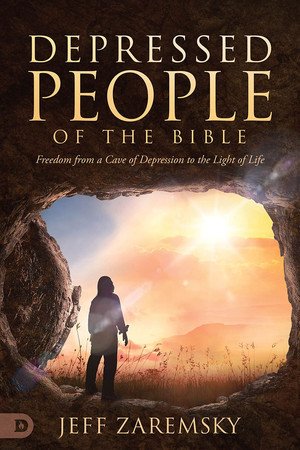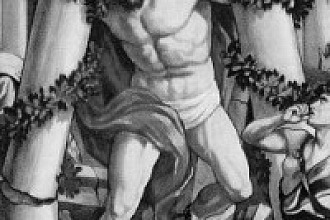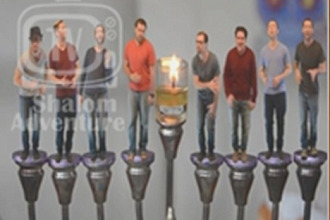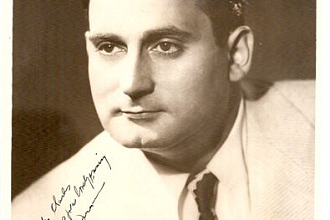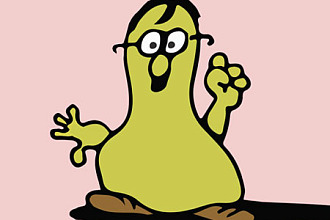…When I sit in darkness, the Lord will be a light to me (Micah 7:8).
Until I entered my 50s, I had never been depressed in my entire life—not even once. Then the summer of 2017 arrived, and my world suddenly became a total mess. I didn’t see it coming. My nightmare started when I lost my ability to sleep at night, or even to take naps during the day. The joy of living quickly vanished. In sheer desperation, I started taking powerful pharmaceutical drugs. Lorazepam was the worst. Then I became severely depressed. Gazing at myself in the mirror, I discovered that all light had left my eyes. My appetite vanished, and I was getting thinner and thinner. My future looked as dark as midnight. I even had suicidal thoughts, which were completely abnormal for me. I felt helpless, hopeless, and alone.
Today, that awful ordeal is over. What a relief! After my complete recovery, I decided to share my story publicly by writing a small booklet entitled, Help for the Hopeless. I was amazed at the response. So many contacted me saying that they could fully relate to my struggles. They were also encouraged to know that they were not alone, and that there was hope for them, too.
Rest assured there is hope for you as well.
Jeff Zaremsky’s new book, Depressed People of the Bible, gives you tools that can help you. Jeff also connects his readers with the work of Dr. Neil Nedley, a brilliant physician in California who has become an expert in helping people find their way out of dark holes. During my depression, I attended Dr. Nedley’s Depression and Anxiety Recovery Program. What a wonderful program that was! With my own eyes I saw my fellow participants experience miraculous transformations. One young lady was like a zombie when the program started. She hardly spoke. She just stared blankly. At the end of only ten days, she was smiling and laughing. It was a miracle!
Dr. Nedley’s program is comprehensive. Participants are placed on a healthy diet. We exercise daily, drink lots of water, attend lectures, talk to counselors, are given full-body massages, listen to classical music, and experience the joy (or shock!) of intense hot-then-cold water treatments, which can almost bring the dead back to life.
But one of the most significant parts of Dr. Nedley’s program is the bloodwork. Samples of our blood are sent to labs, which allows Dr. Nedley’s trained eye to see exactly what’s going on inside our brains. When he saw my blood results, Dr. Nedley knew exactly what supplements I was low in and needed to take. It’s amazing how the combination of carefully prescribed natural supplements literally change my life. Wow! What a journey!
During my depression, one of the things that helped me so much was learning to rely on the healing promises of the Bible. Scriptures like the following became my lifeline to hope and sanity:
■ I have loved you with an everlasting love… (Jeremiah 31:3).
■ Call upon Me in the day of trouble; I will deliver you, and you shall glorify me (Psalm 50:15).
■ I will restore health to you, and heal you of your wounds, says the Lord (Jeremiah 30:17).
■ Come to Me…I will give you rest (Matthew 11:28).
■ Peace I leave with you, My peace I give to you… (John 14:27).
■ I will never leave you nor forsake you (Hebrews 13:5).
■ Fear not, I will help you (Isaiah 41:13).
Night after night, day by day, I would think about those Bible promises, and others like them. I also searched my heart and confessed every wrongdoing I could think of. I prayed and prayed.
Truly, God’s promises became my life. In my darkest days, I also learned a most valuable lesson: Whenever my mind, feelings, head, or heart tells me I’m hopeless, it’s not true at all.
Those thoughts are lies.
I learned to rely on what God says, not what I think.
The struggles of certain people in the Bible also greatly encouraged me, such as what happened to the prophet Elijah. He became so depressed he wanted to die. I could totally relate. I felt like that too. Many times I felt the pressing temptation to end my life. But, thank God, He gave me strength to keep on going. Finally, the fog lifted, and my brain snapped back to normal. How grateful I am! Those dark days are now behind me.
The information in Depressed People of the Bible will help you recover your life, too.
I’m so glad that Jeff Zaremsky wrote this book!
-
- Are you or your loved one experiencing deep sadness or a feeling of emptiness nearly every day for the past two weeks or more?
- Are you experiencing a markedly diminished interest or pleasure in all or nearly all activities for the past two weeks or more?
- Have you experienced a decrease or increase in appetite?
- Or if your weight is 100 pounds have you gained or lost 5 pounds or more?
- If you weigh 150 pounds have you gained or lost 7 pounds or more?
- If you weigh 200 pounds have you gained or lost 10 pounds or more?
- Do you sleep more than you used to?
- To total more than 40 minutes per day?
- Or are you more sleepy in the day time and feel like taking naps frequently? (if you are not used to napping)
- Or sleep less than you used to?
- To total more than 40 minutes shorter sleep duration?
- Or difficulty falling asleep or earlier awakening?
- Have you been more agitated or irritated with yourself or others? Or you would qualify for a yes to number 5 if your physical movements have been slower than they used to be.
- Have you experienced fatigue?
- Have you experienced feelings of worthlessness? Have you experienced feelings of excessive or inappropriate guilt?
- Have you experienced a diminished ability to think or concentrate? Especially if there is a difficult decision to make? Do you experience a decrease in your ability to make sound decisions?
- Do you have recurrent thoughts of death? Or have you seriously considered harming someone else? Have you seriously considered suicide? Have you attempted suicide?
Depression is a constellation of symptoms, not a disease. A diagnosis of depression is only a diagnosis of symptoms, not the real problem. A runny nose is a symptom, not a disease. If we just treat symptoms, you might be prescribed a tissue to help your runny nose. But if we really wanted to treat the problem, the bacteria that is causing the nose to run, then we would work on attacking the bacteria. Once the bacteria is killed, the runny nose stops. Not the other way around. Too often we try to treat depression, when that is only the symptom. It is better to find out what hits are putting the person over the top and treat them, then the depression will stop.
Depression is disabling, but it does not have to be a permanent disability. A person with no legs does not have the ability to walk independently. They have a disability. Thankfully many people without legs can still be mobile with the use of prosthetic legs, wheel chairs, etc. But their original legs will never grow back, they can never be “healed” in the sense of regaining their own flesh and blood legs. Depression is different; depression can go away. A person with the symptoms of depression can be healed of those symptoms and have the depression go away. Their original cheerfulness and productivity can come back. It has happened to many people and it can happen for you also.
Too often depression is thought of as an incurable disease or irreparable disability. It is used as an excuse. Hope is lost, and healing becomes that much harder. A person with that type of thinking resolves themselves to the lie that this is how it is going to be forever. They then expect everyone around them to accept as normal their mood swings, verbal attacks, negative outlook, nasty behavior, and unsociable conduct. But those harmful thoughts and actions are not healthy for the person or anyone else. Nor do they have to be permanent. There is hope, there is healing.
When we keep our depression triggers under four, the symptoms of clinical depression leave, and the person returns to who they really are.
The 10 hits that Dr. Nedley identifies as being depression triggers are:
-
- Genetic; 2. Developmental; 3. Lifestyle; 4. Circadian Rhythm; 5. Addiction; 6. Nutrition; 7. Toxic; 8. Social/Complicated Grief; 9. Medical Condition; and 10. Frontal Lobe.
- Genetic hit category: Family history of depression or suicide in a first-degree relative.
- Developmental hit category: Early puberty in girls (beginning menstruation by age 11 years or younger), history of depression in adolescence, not being raised by both biological parents, sexual abuse, and being raised or living with someone who is an alcoholic or drug addict.
- Nutrition hit category: Low dietary tryptophan; low omega-3 fat intake; low folic acid intake; low vitamin B intake; diet high in cholesterol, saturated fat, and sugar; and marked anorexia and weight loss.
- Social hit category: Absence of social support, negative or stressful life events, low social class, being raised by grandparents, and immediate family member being an alcoholic or drug addict.
- Toxic hit category: High lead levels; high mercury levels; high arsenic, bismuth, or other toxin levels; or high risk of exposure to these toxins.
- Circadian rhythm hit category: Regular insomnia, routinely sleeping more than 9 hours per day or less than 6 hours per day, and not having regular hours for sleeping and eating.
- Addiction hit category: Use of alcohol, cigarette or tobacco use, heavy caffeine use, recreational drug use (including marijuana), daily use of benzodiazepines, or chronic narcotic use for more than 30 consecutive days.
- Lifestyle hit category: Not on a regular aerobic exercise program, not regularly exposed to day-light or a medical-grade light box for at least 30 minutes a day, and rarely breathing fresh air.
- Medical condition hit category: Hepatitis C, recent head injury, stroke, heart disease, terminal cancer, Parkinson’s disease, uncontrolled diabetes, severe postpartum stress, premenstrual tension syndrome, inadequately treated thyroid disease, lupus, inadequately treated adrenal gland disease.
- Frontal lobe hit category: On low carbohydrate diet, on high meat or high cheese diet or eating lots of rich food, entertainment TV or movie addiction, entertainment Internet or chat Internet addiction, frequent sexual stimulation that activates right frontal lobe, regular exposure to syncopated rhythm music and/or videos, conscious suppression of frontal lobe activity, lack of regular abstract thinking, acting against one’s conscience or known value system.
Of these 10 hits, only the genetic and the developmental ones are not reversible. Most of the other reversible hits are directly related to lifestyle choices.2
Many of the Bible people described in this book, such as Moses, Elijah, Jonah, David, Joseph, and others, had their life-changing experiences in a wilderness or cave type of setting when they were in the midst of a melancholy or even depressed state of mind.
Depression Test
Depression could be described as a cave with no opening and no light. It is cold. It is a dark place where no one else is allowed in. Time stops, and time does not matter. Depression is a state that no one else can understand or can relate to, and which no one else has experienced the way we are experiencing it. At least that is how it might feel.
But there are others who can relate, including some of the “big” names in the Bible. And the Lord is able to command the stone to be rolled away from the opening of the cave. He is able to say, “Let there be light” and light will shine on our face and path. He is able to awaken us and call us forth from the pit, and bring us back to life. He is able to instruct others to unwrap us and set us free. He is able to make us whole again.
Would you like to be made whole again? Would you like to see your loved one come out of the cave? Keep reading and you will be able to follow the path that many others have taken out of the cave and into the light.
Pause, Ponder, and Proceed
-
- How many of the nine symptoms do you, or the person you are trying to help, currently have?
- How many depression hits do you, or the person you are trying to help, have?
- Which one would you like to start working on reversing?
- Have you, or the person you are trying to help, ever thought of depression as an incurable disease or an unhealable disability?
- Do you, or the person you are trying to help, want to be healed and return to how you really are?
- Are you ready to start reading about people in the Bible who struggled with the same difficulties and thoughts that you have?
This is a part of a new book by Rabbi Jeff Zaremsky
Click here to buy the book
Notes
-
- “Depression & Recovery Session 1” with Dr. Neil Nedley; https://youtu.be/wymVfJgP5jI.
- Neil Nedley, MD and Francisco E. Ramirez, MD, “Nedley Depression Hit Hypothesis: Identifying Depression and Its Causes,” American Journal of Lifestyle Medicine, Vol. 10, Issue 6, November 1, 2016, pages 422-428.


